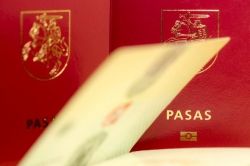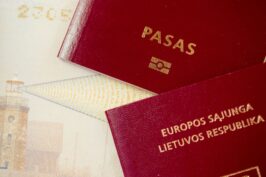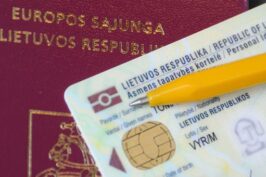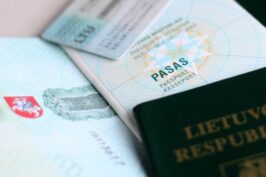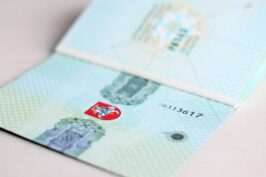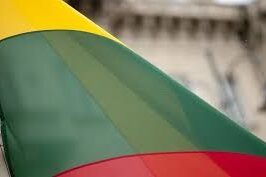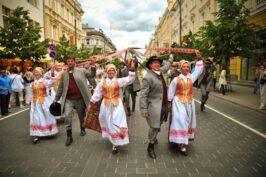- Home
- Dual Citizenship in Lithuania
Dual Citizenship in Lithuania
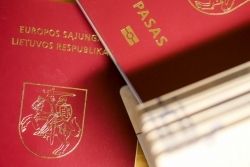
Dual Citizenship in Lithuania: Exceptional Cases and Requirements
Dual (double) citizenship can be allowed in Lithuania in exceptional cases only.
Who Qualifies for Dual Citizenship in Lithuania?
The cases when Dual citizenship in Lithuania is allowed in Lithuania include:
- A person was exiled from occupied Lithuania prior to 11 March 1990 or is a descendant (a child, a grandchild or a great-grandchild) of a person deported from occupied Lithuania prior to 11 March 1990;
- A person left Lithuania prior to 11 March 1990 or is a descendant (a child, a grandchild or a great-grandchild) of a person having left Lithuania prior to 11 March 1990;
- Child dual citizenship cases;
- Child-adoption cases;
- Marriage cases;
- Acquisition of citizenship of Lithuania in exceptional cases or by a person having a status of a refugee;
- Retention of Lithuanian citizenship or granting of Lithuanian citizenship for exceptional merit.
If you or your ancestors meet any of these conditions, you may be eligible for dual citizenship in Lithuania.
Conditions for Dual Citizenship in Lithuania for Exiles and Their Descendants
A person exiled from occupied Lithuania prior to 11 March 1990 is a person compulsorily at a decision of a court or other institutions exiled from Lithuania (sent to a concentration camp, imprisoned or deported for forced labour etc.) for resistance to the occupation regimes or because of political, social or origin-related reasons (or a descendant of such a person); the said provisions are applicable to a descendant of such a person. If this person was a Lithuanian citizen prior 15 June 1940, or is a descendant (a child, grandchild, or great-grandchild of such a citizen), they may qualify for dual citizenship in Lithuania.
Dual Citizenship in Lithuania for Lithuanian Emigrants and Their Descendants
A person left Lithuania prior to 11 March 1990 is a person who was a citizen of Lithuania prior to 15 June 1940 and left Lithuania prior to 11 March 1990, or his (her) descendents having left the territory of today Lithuania for another state prior to 11 March 1990, if their country of permanent residence was out of Lithuania on 11 March 1990. This definition is not related to persons having left the territory of Lithuania for the territory of the formed Soviet Union after 15 June 1940.
For qualifying emigrants and their families, dual citizenship in Lithuania can be restored or retained under current laws.
Dual Citizenship in Lithuania for Children: What You Need to Know
In course of growing of migration flows from Lithuania and the number of marriages concluded by and between citizens of Lithuania and citizens of foreign states, the number of children with dual citizenship is growing as well. According to the current legislation of Lithuania, a child has the right to be a citizen of Lithuania and a citizen of another state if he or she acquired Lithuanian citizenship by birth (one or both parents were citizens of Lithuania at birth) and the citizenship of another state was acquired by birth or the citizenship of another state was acquired under 18 years old not by birth.
Marriage and Dual Citizenship: Lithuanian Legal Framework
In case of a marriage, a person got married to an alien may have a dual citizenship, if the person was automatically granted a citizenship of the state of residence of the spouse after registration of the marriage with the citizen of the foreign state. Such practice of naturalization is more typical for Islamic states where no supplemental formalities are required for granting the citizenship and the only fact of registration of marriage is sufficient. Such persons are not required to renounce the citizenship of another country.
Adoption and Dual Citizenship in Lithuania: Key Regulations
A person (being a citizen of Lithuania) may be adopted by a citizen or citizens of a foreign state and acquire a citizenship of the foreign state. A citizen or citizens of Lithuania may adopt a person that is a citizen of a foreign state. A citizen of Lithuania can also be a citizen of another state if he:
- a person who is adopted by a citizens (citizen) of Lithuania under the age of 18 and as a result has acquired Lithuanian citizenship; or
- a person is a citizen of Lithuania if he was adopted by citizens (citizen) of another state before reaching the age of 18 and as a result acquired the citizenship of another state.
Exceptional Dual Citizenship in Lithuania Cases: Merit-Based and Refugee Status
More rare cases of dual citizenship in Lithuania are related to exceptional granting the citizenship of Lithuania to some persons for certain merits for Lithuania or to those provided a status of a refugee.
Document Preparation for Lithuanian Dual Citizenship Applications
The process of preparation of the documents for Dual citizenship in Lithuania in case of Reinstatement of Lithuanian citizenship shall be started from collection of the required documents and search for the lacking ones. Such a search is often carried out at archives of Lithuania and Germany. The search for documents at Lithuanian and German archives may continue for from 5 to 30 workdays, in some cases longer. After collection of the required documents, they shall be certified according to the procedure provided in laws and their translation shall be carried out, if the language of the documents is other than Lithuanian. Documents issued in foreign states shall be certified by Apostille or legalized, unless otherwise is provided by international treaties of Lithuania or legal norms of the European Union.
Steps to Apply for Dual Citizenship in Lithuania
The steps in the process of acquiring Dual citizenship in Lithuania depend on the specific procedure being applied. The main steps to apply for dual citizenship are:
- Collection of documents;
- Preparation of documents;
- Submission of documents to the Migration department;
- Making a decision;
- Issuance of a Lithuanian passport.
Required Documents for Reinstatement of Lithuanian Citizenship
The principal documents to be submitted for a Reinstatement of Lithuanian citizenship:
- The application completed in Lithuanian;
- The passport;
- The documents certifying that the person was a citizen of Lithuania prior to 15 June 1940 or is a descendant of a person who was a citizen of Lithuania prior to 15 June 1940;
- The evidences of the circumstances proving the person to be eligible for dual citizenship;
- The documents certifying the family connections;
- A document evidencing the change of name or surname where such personal data have been changed.
Documents Proving Lithuanian Citizenship Before June 15, 1940
The documents certifying that the person was a citizen of Lithuania prior to 15 June 1940 may be following:
1. Lithuanian passports issued before 15 June 1940;
2. Documents certifying military service of the person in Lithuanian army or civil service in Lithuania;
3. Certificates of Birth or other documents where the citizenship is specified;
4. Any certificates issued in Lithuania before 15 June 1940 or certificates issued on the base of documents issued before 15 June 1940.
If the above-listed documents are absent, documents on education, employment or living in Lithuania issued before 15 June 1940 shall be provided.
Where to Submit Documents for Dual citizenship in Lithuania Applications
The documents shall be submitted to:
- a diplomatic mission or a consular institution in a foreign state – Lithuanian diplomatic missions and Consular institutions;
- the Migration department in Lithuania – Migration department.
Timeline for Lithuanian Citizenship Reinstatement Process
According to the relevant norms of Lithuania, a decision on Reinstatement of Lithuanian citizenship shall be passed no later than within 6 months; in practice, the process may last for about 6-12 months and even longer in certain cases.
Key Benefits of Dual Citizenship in Lithuania:
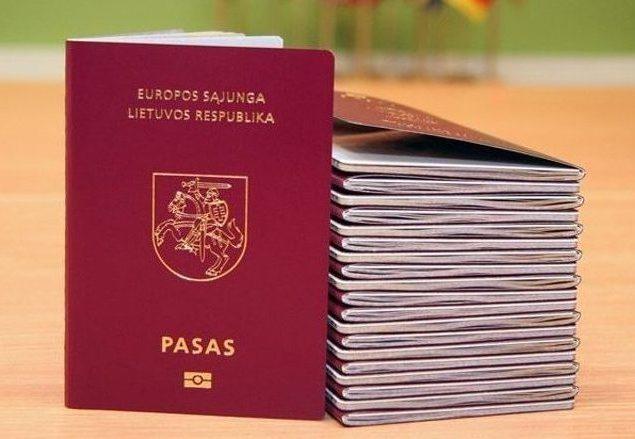
1. Freedom of Movement
As a Lithuanian (EU) citizen, you have:
Visa-free access to the Schengen Area and most EU countries.
The right to live, work, and study in any EU member state.
If your second citizenship is non-EU (e.g., USA, Canada, UK), you also gain mobility outside the EU.
2. Preservation of Lithuanian Identity
Many Lithuanians who emigrated during war or Soviet occupation, and their descendants, value dual citizenship because it allows them to:
Maintain strong cultural and historical ties to Lithuania,
Reconnect with family roots and heritage.
3. Access to Social and Public Services
Lithuanian citizens (even with another citizenship) may:
Access state healthcare and education while residing in Lithuania,
Benefit from certain social security rights or pensions (depending on residency and agreements).
4. Property and Inheritance Rights
Dual citizens have the unrestricted right to own property in Lithuania.
Easier management of inheritance and legal matters related to family estates.
5. Economic and Business Opportunities
Lithuanian citizenship may offer:
- Tax advantages for EU-based business activities,
- Easier registration of companies or investment in Lithuania,
- Access to EU grants or programs.
Free Legal Assessment for Lithuanian Citizenship Eligibility
Free Legal Assessment: Lithuanian Citizenship Eligibility
The lawyers of MIGRATION LAW CENTER offer a free legal Assessment (analysis) of your options for obtaining Lithuanian citizenship. To receive a detailed analysis, please complete an application form by clicking this link – FORM.
Following a thorough legal analysis of your options that would allow to obtain Lithuanian citizenship, our lawyers will provide you with a written response (analytical results) regarding your options of obtaining Lithuanian citizenship and further requirements as well as procedure processes.
Can I get free legal advice on Dual citizenship?
Yes, to learn more about Dual citizenship in Lithuania, the process of preparing and submitting documents to competent state institutions, or to order legal assistance, please contact us:
• Email: info@migration.lt
• Phone: +37068563053
If you have any questions regarding Lithuanian citizenship or should you require more information or help, please contact us by e-mail: info@migration.lt or phone: + 370 6 1861886. We will gladly help you.
